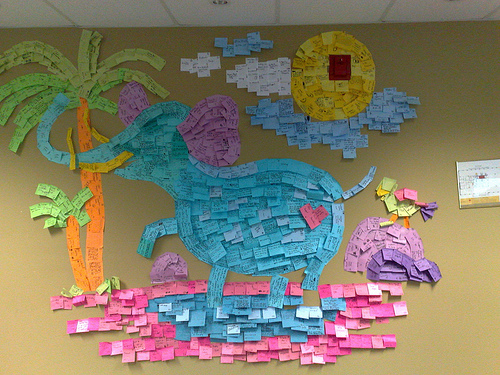2. During the meeting...
After the preliminary stages, let's move into the real PD!The facilitator of the meeting will have a strong interest in gathering the “materials” with comments and questions obtained during the preparatory stages to feed and start the group work and discussions, avoid starting a discussion with a big blank board, don't hesitate to write down even a few key words, even controversial ones…This is excellent to get people talking!
Also, in a general way, here are two procedures that encourage participants to wake up to participation during the whole seminar, other than using buckets of cold water, swearwords and kicking their rear ends, of course!
- 1. Tell participants that all presentations (refer to point 3), power point and others, will be available on-line some days or weeks after the seminar. This is to avoid people using their time to compulsively take notes during the presentations and stop listening to the content!
- 2. The facilitator will make recaps as often as possible during the seminar, almost in real-time depending on the nature and complexity of discussions and the IT means available (i.e. screen projector with Freemind software), all to get people to engage further, to listen, reflect and discuss rather than writing down the words of others.
Recaps can also be done by others, especially in workshops, taking notes (or using Freemind) so that the feedback can really be discussed before going back to the plenary room. This recap work can be made easier by handing out forms specially designed for this (by the organisers and facilitator) to the people in charge of the recaps.
This recap work entails a prior discussion on the focus that organisers expect from the sessions and workshops. And instead of preparing the recaps and conclusions beforehand, even before the seminar takes place - a big classic in international meetings! - it will be important for organisers and facilitators to discuss the focuses of the sessions and workshops during the preparatory stage of the meeting. These focuses can also be suggested in advance to registered participants of a seminar, meaning they are posted on-line before the seminar takes place. Like this they can be changed by participants before and during the seminar.
This procedure:
- will largely facilitate global recaps of the seminar,
- will favour a more democratic preparation than usual,
- and will ensure a reasonable rhythm to communicate the recaps after the seminar.
This exercise can be particularly useful for the organisers of a seminar or the host organisation, who can then keep track of the work accomplished. These preliminary and posterior stages can also be done through the seminar's website. It can be modulated in thousands of ways and allows keeping a record of some collective progresses.
In this same sense, it is also possible to share the answers to the questions asked on-line so that they can then be added to and re-formulated live, collectively. This ensures a continuity between the phases of the seminar and justifies the efforts made by those who took the time to participate on this on-line game.
In order to encourage opinions and questions, even if people don't like talking much and are not used to speaking in public, we can suggest using “question or comment cards” (just a few lines).
They will be distributed at the entrance to the seminar room, several copies. Once they have been completed, they can then be put into a box during the seminar (organisers shall have to empty this box for questions and comments regularly) or given to the facilitator during a session.

The facilitator can then group several of the questions and comments before the feedback and answer them live.
If there is not enough time for this, questions and comments can be posted on-line to extend the discussion even beyond the end of the seminar. This could lead to Creating discussion forums…
Another possible solution is for the facilitator to group the questions and comments by topic and then go to a resource person to communicate them to this person: this resource person then takes the time to answer these questions and comments publicly on the Internet.
It is also possible to imagine this person giving the answers to the facilitator who will then read them out in a public session or post them on-line. This solution using the facilitator has the advantage of being synthetic -where a “specialist” would probably delay the answers - but it multiplies the number of intermediaries…and carries the risk of losing information and quality along the way.
Developing role-play. We are mentioning this here, but it deserves a much larger explanation further on. Role-play can be an excellent way of making ideas, reflections and behaviours surface; also to overcome conflicts, express things that go untold, etc. There is a large variety or role-play exercises and techniques for this. They are very useful as long as the facilitator really masters them and is able to coordinate it; the facilitator must then analyse the role-play and then give a public summary of them.